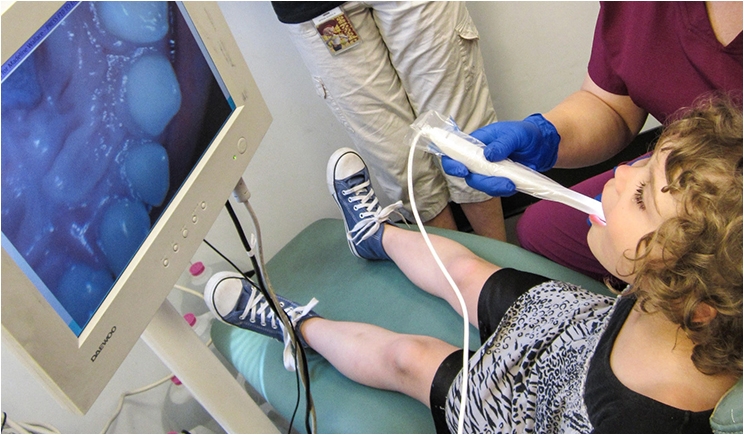
Tooth decay is the most widespread chronic childhood disease. Ronald McDonald House Charities of the Ozarks reports that 52% of all 6- to 8-year-olds nationwide suffer from it, while almost 80% of tooth decay in children from low-income families is untreated. Poor oral health extends beyond the mouth to affect the health, speech, and school attendance of these children, causing pain and embarrassment.
“In my class, I see children who can’t focus because they have pain in their mouth,” said Krystal Shumate, a Wonder Years teacher at McGregor Elementary School in Springfield, Mo. “It affects how they socialize. It affects their mood. And it can affect how they eat. If they have pain in their mouth and they come in in the morning and they can’t eat that healthy breakfast that we provide for them, that affects their whole day. Kids are better equipped to learn when their mouth is healthy because they don’t have the distraction of pain or embarrassment.”
Known affectionately as the Tooth Truck, the Ronald McDonald Care Mobile unit has served more than 22,000 children during more than 51,000 appointments valued at more than $13.3 million in the Ozarks region since 2002. It visits schools 5 days a week with a goal of completing the treatment plan of each child it sees. Though the mobile office measures just 200 square feet, it is equipped to provide a full range of dental services.
“The purpose is to provide dental care to kids who would not have access to care otherwise,” said Mindy Muñoz, program director of Ronald McDonald Care Mobile. “These are children who most likely have never been to a dentist before or have maybe been for an emergency appointment. Our goal is to complete every child’s treatment plan so they are cavity-free and at the same time also instill a strong sense of self-worth.”
Many families in the region have significant barriers to accessing dental healthcare. For example, 71% of Missouri dentists don’t accept Medicaid patients because the reimbursement rate for their service is so low. Or, transportation may not be available or reliable. Plus, parents may have to work and can’t take time off for dental appointments. The truck, then, provides children with dental care while they’re already at school.
Treatments include restorative procedures like fillings and crowns (38.5%); preventive care such as cleanings, fluoride, and sealant (42%); diagnostics including exams, evaluations, and x-rays (16.5%); adjunct services like consultations and anesthesia (0.25%); oral surgery like extractions (2%); and endodontics including root canals and pulpotomies (0.75%).
Any child who qualifies for the free or reduced school lunch program is eligible for treatment on the Tooth Truck, regardless of whether or not they have Medicaid coverage. School nurses identify the children with the greatest needs and work with the Tooth Truck staff to educate parents on the benefits of Medicaid coverage for their children and families.
The Tooth Truck focuses on students in the second and sixth grades, which are critical years for educating children and encouraging them to incorporate oral hygiene into their daily routines, though it regularly sees children from infancy through their teen years.
“From the very first time they’re on the truck, we’re talking to them about ‘Here’s a toothbrush. We’re going to send you home with this. Do you know how to use it?’ It may seem like a really easy question, but we have kids who don’t have a toothbrush at home. Toothpaste is another thing. We all think kids have toothpaste, but a lot of them don’t,” said Sarah Cimino, DDS, a general dentist who has been providing services on the Tooth Truck for the past 6 years.
Recently, MouthWatch donated one of its intraoral cameras to the Tooth Truck. The ergonomic device directly integrates with popular image systems including Dexis, Schick, and Apteryx. Also, the 6 LEDs around its lens provide balanced and consistent illumination for clear images. With it, the Tooth Truck’s staff can show children where they aren’t brushing well, or where cavities are on their back teeth.
“We recently were able to use it with a young autistic child, 5 years old, who was hesitant to allow any part of the cleaning appointment but stated that ‘I want to see my teeth on the TV!’” said Cimino. “As a result, we were able to visually examine all of her teeth with the camera when otherwise we wouldn’t have been able to do anything. The child left with a huge smile on her face and a sense of accomplishment that we hope will carry through to her next appointment.”
“I can tell you that the kids love to go to the Tooth Truck,” said Kirsten Weiss, the nurse at McGregor Elementary School. “They get so excited. Sometimes they’ll come in after they know they’ve turned in their application every day and go, ‘Is today the day the Tooth Truck is coming?’ And I have to say, ‘Not yet, but it will be here soon.’ I just think it’s wonderful they have a positive association with dental care.”
All of the Tooth Truck’s services are offered free of charge. The program has an operating budget of $600,000, half of which is funded through Missouri Medicaid, with the remainder coming from the community. Additional support also is welcome. For example, donors can underwrite the treatment plan for a single child. MouthWatch conducts outreach programs for public health initiatives like the Tooth Truck and is open to additional partnerships as well.
Related Articles
RAM Reaches Thousands of Needy Patients in the United States
Team USA Athlete Hosts Smile Drive for Local Kids
Most Children on Medicaid Lack Dental Services



